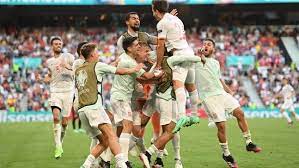By Samindra Kunti
June 28 – In the end, after 120 minutes of sheer drama, industry and balletic skills that reaffirmed football’s endearing qualities, there was redemption for Unai Simon, Alvaro Morata and Spain with a 5-3 overtime win for the ages against Croatia.
And yet it had all began in such dramatic fashion for Luis Enrique’s team. Simon’s 17th minute howler was of a magnitude seldom seen at the elite level and so question marks over Spain remained, which, like Croatia, had taken its liberty with the slow-burn format of the finals, teetering on the edge of elimination before convincing in the final group match with a 5-0 trashing of Slovakia.
It was something of a renaissance, inspired by the return of veteran Sergio Busquets, the same way Luka Modric had steered his team to victory against Scotland.
Could the Spanish maintain the intensity and purpose of the previous win? Could they speed up the match when required against a team of greater pedigree? The early warning signs were ominous for Croatia. From the onset, Spain, predictably, went into default mode, claiming the ball pretty much all the time, but there was nothing academic or tedious about Enrique’s team. His attack carved open the Croatian defense with speed and purpose, and both Koke and Alvaro Morata should have done better from close range.
And then, as Spain was taking an icy grip on the match, absolute calamity struck in the 20th minute when goalkeeper Simon failed to control a long back pass from Sergio Busquets. Croatia were galvanized and Spain exposed at the back as the fragile team of the group phase, but despite the Simon psychodrama the Spanish did respond well, flooding forward. The true test of any team is how you respond to falling behind and Pablo Sarabia smashed in the equalizer from in the 38th minute.
After the break, right-back César Azpilicueta headed in after connecting with one of many searching crosses from the left. At the other end, Simon found redemption with a near-post save from Josko Gvardiol. Ferran Torres, a player of dainty touches and precise crosses, netted Spain’s third in the 76th minute. And that’s where it should have ended. Except, it didn’t.
Croatia rekindled their 2018 mood with late strikes from Mislav Orsic and Mario Palisic. Why had the Croatians not played like this before? Orsic proved a scourge for Spain’s frail central defenders. Croatia, masters of chaos, were finding the angles and the spaces. It was tournament football at its best, high on adrenaline, drunk in the afternoon sun at Parken. There were shades of Spain – Yugoslavia in Euro 2000 when the Spanish defeated their opponents 4-3.
At the time, Spain were a fun team, far from ruthless and not hellbent on possession. As a consequence, La Roja never won anything. In Copenhagen, Spain rediscovered that joyous, unrestrained soul. Morata scored a goal worthy of Marco Van Basten, with a first touch of the gods. Then Mikel Oyarzabal completed the sumptuous victory. The Croatians were dead on their knees.
“We took the lead from a lucky goal. Afterwards, they were better – at least for the first 60 minutes,” said Luka Modric. “We stood too deep in our half and let them play. When we attacked more, we played better and created more chances and that is where the equaliser came from; when we showed quality and character. At the start of extra time we had them on the ropes but we failed to score from two good chances. Then the game turned around and we didn’t have the strength to come back.”
But this was about more than simply the minutiae of the match of an extraordinary match. This was about erasing all the previous doubt and inhibitions and a first round bereft of creativity, identity and leadership for Spain. The team had been jeered off at home at La Cartuja against both Sweden and Poland. The level of a bloodless Spain was under scrutiny. Nothing ever. seemed in place. The Spanish had played Tiki-taka and yet it wasn’t really Tiki-taka. It was almost a caricature.
Of course, coach Luis Enrique was never going to abandon 4-3-3 and the possession-based soccer that delivered so much success, but it often felt as if he forced a limited generation of players into a straitjacket. And here, against Croatia, the first opponent of note, Spain delivered. They will play Switzerland in the last eight.
Contact the writer of this story at moc.l1714936159labto1714936159ofdlr1714936159owedi1714936159sni@i1714936159tnuk.1714936159ardni1714936159mas1714936159

